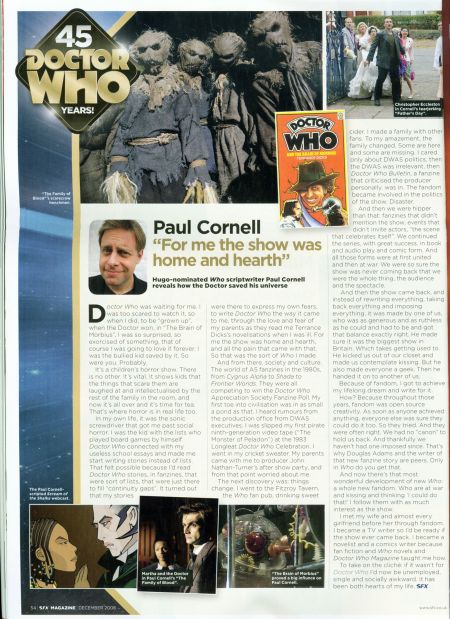For me the show was home and hearth
Hugo-nominated Who scriptwriter Paul Cornell reveals how the Doctor saved his universe
Doctor Who was waiting for me. I was too scared to watch it, so when I did, to be "grown up", when the Doctor won, in "The Brain of Morbius", I was so surprised, so exorcised of something, that of course I was going to love it forever. I was the bullied kid saved by it. So were you. Probably..
It's a children's horror show. There is no other. It's vital. It shows kids that the things that scare them are laughed at and intellectualised by the rest of the family in the room, and now it's all over and it's time for tea. That's where horror is in real life too. In my own life, it was the sonic screwdriver that got me past social horror. I was the kid with the lists who played board games by himself. Doctor Who connected with my useless school essays and made me start writing stories instead of lists. That felt possible because I'd read Doctor Who stories, in fanzines, that were sort of lists, that were just there to fill "continuity gaps". It turned out that my stories were there to express my own fears, to write Doctor Who the way it came to me, through the love and fear of my parents as they read me Terrance Dicks's novelisations when I was ill. For me the show was home and hearth, and all the pain that came with that. So that was the sort of Who I made.
And from there, society and culture. The world of A5 fanzines in the 1980s, from Cygnus Alpha to Shada to Frontier Worlds. They were all competing to win the Doctor Who Appreciation Society Fanzine Poll. My first toe into civilisation was in as small a pond as that. I heard rumours from the production office from DWAS executives. I was slipped my first pirate ninth-generation video tape ("The Monster of Peladon") at the 1983 Longleat Doctor Who Celebration. I went in my cricket sweater. My parents came with me to producer John Nathan-Turner's after show party, and from that point worried about me.
The next discovery was: things change. I went to the Fitzroy Tavern, the Who fan pub, drinking sweet cider. I made a family with other fans. To my amazement, the family changed. Some are here and some are missing. I cared only about DWAS politics, then the DWAS was irrelevant, then Doctor Who Bulletin, a fanzine that criticised the producer personally, was in. The fandom became involved in the politics of the show. Disaster.
And then we were hipper than that: fanzines that didn't mention the show, events that didn't invite actors, "the scene that celebrates itself". We continued the series, with great success, in book and audio play and comic form. And all those forms were at first united and then at war. We were so sure the show was never coming back that we were the whole thing, the audience and the spectacle.
And then the show came back, and instead of rewriting everything, taking back everything and imposing everything, it was made by one of us, who was as generous and as ruthless as he could and had to be and got that balance exactly right. He made sure it was the biggest show in Britain. Which takes getting used to. He kicked us out of our closet and made us contemplate kissing. But he also made everyone a geek. Then he handed it on to another of us.
Because of fandom, I got to achieve my lifelong dream and write for it.
How? Because throughout those years, fandom was open source creativity. As soon as anyone achieved anything, everyone else was sure they could do it too. So they tried. And they were often right. We had no "canon" to hold us back. And thankfully we haven't had one imposed since. That's why Douglas Adams and the writer of that new fanzine story are peers. Only in Who do you get that.
And now there's that most wonderful development of new Who: a whole new fandom. Who are at war and kissing and thinking 'I could do that!' I follow them with as much interest as the show.
I met my wife and almost every girlfriend before her through fandom. I became a TV writer so I'd be ready if the show ever came back. I became a novelist and a comics writer because fan fiction and Who novels and Doctor Who Magazine taught me how. To take on the cliché: if it wasn't for Doctor Who I'd now be unemployed, single and socially awkward. It has been both hearts of my life.
Captions:
Christopher Eccleston in Cornell's tearjerking "Father's Day".
"The Family of Blood"'s scarecrow henchmen.
The Paul Cornell scripted Scream of the Shalka webcast.
Martha and the Doctor in Paul Cornell's "The Family of Blood".
"The Brain of Morbius" proved a big influnce on Paul Cornell.
Disclaimer: These citations are created on-the-fly using primitive parsing techniques. You should double-check all citations. Send feedback to whovian@cuttingsarchive.org
- APA 6th ed.: (Dec. 2008). For me the show was home and hearth. SFX p. 54.
- MLA 7th ed.: "For me the show was home and hearth." SFX [add city] Dec. 2008, 54. Print.
- Chicago 15th ed.: "For me the show was home and hearth." SFX, edition, sec., Dec. 2008
- Turabian: "For me the show was home and hearth." SFX, Dec. 2008, section, 54 edition.
- Wikipedia (this article): <ref>{{cite news| title=For me the show was home and hearth | url=http://cuttingsarchive.org/index.php/For_me_the_show_was_home_and_hearth | work=SFX | pages=54 | date=Dec. 2008 | via=Doctor Who Cuttings Archive | accessdate=27 December 2025 }}</ref>
- Wikipedia (this page): <ref>{{cite web | title=For me the show was home and hearth | url=http://cuttingsarchive.org/index.php/For_me_the_show_was_home_and_hearth | work=Doctor Who Cuttings Archive | accessdate=27 December 2025}}</ref>
